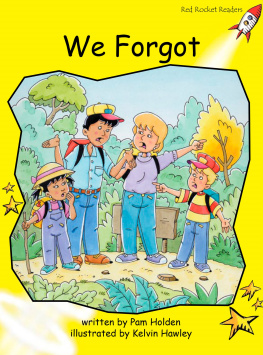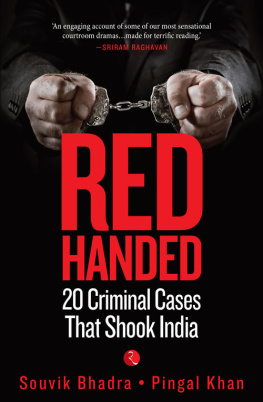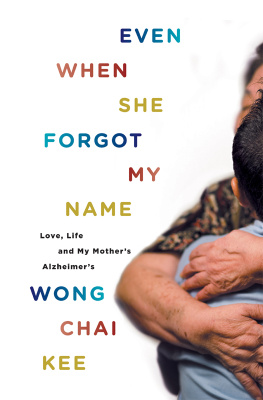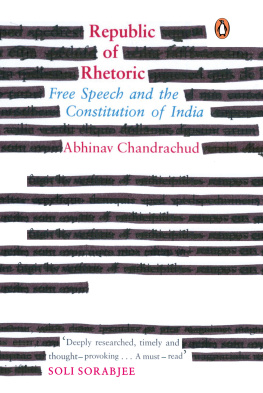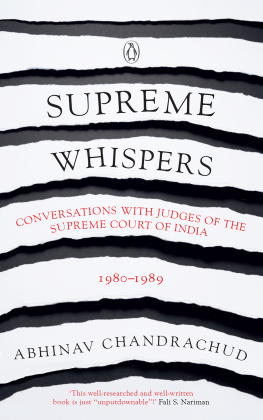Chintan Chandrachud - The Cases That India Forgot
Here you can read online Chintan Chandrachud - The Cases That India Forgot full text of the book (entire story) in english for free. Download pdf and epub, get meaning, cover and reviews about this ebook. year: 2019, publisher: Juggernaut Books, genre: Romance novel. Description of the work, (preface) as well as reviews are available. Best literature library LitArk.com created for fans of good reading and offers a wide selection of genres:
Romance novel
Science fiction
Adventure
Detective
Science
History
Home and family
Prose
Art
Politics
Computer
Non-fiction
Religion
Business
Children
Humor
Choose a favorite category and find really read worthwhile books. Enjoy immersion in the world of imagination, feel the emotions of the characters or learn something new for yourself, make an fascinating discovery.

- Book:The Cases That India Forgot
- Author:
- Publisher:Juggernaut Books
- Genre:
- Year:2019
- Rating:4 / 5
- Favourites:Add to favourites
- Your mark:
- 80
- 1
- 2
- 3
- 4
- 5
The Cases That India Forgot: summary, description and annotation
We offer to read an annotation, description, summary or preface (depends on what the author of the book "The Cases That India Forgot" wrote himself). If you haven't found the necessary information about the book — write in the comments, we will try to find it.
The Cases That India Forgot — read online for free the complete book (whole text) full work
Below is the text of the book, divided by pages. System saving the place of the last page read, allows you to conveniently read the book "The Cases That India Forgot" online for free, without having to search again every time where you left off. Put a bookmark, and you can go to the page where you finished reading at any time.
Font size:
Interval:
Bookmark:
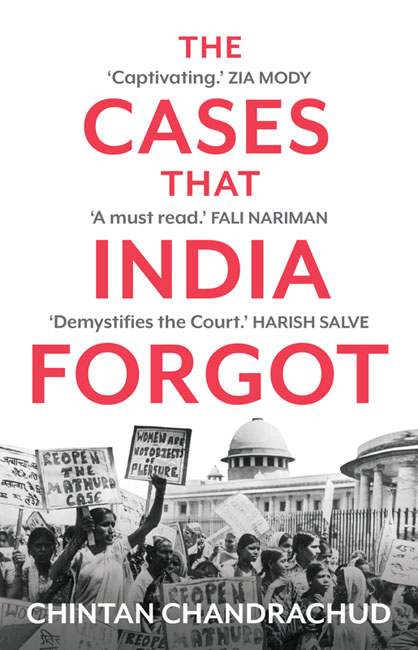
The Cases That India Forgot
Praise for the Book
This book narrates ten captivating stories about Indias forgotten cases. Chandrachuds writing is simple for the lay reader and yet holds the attention of both the lawyer and the legal scholar. The book ignites interest in the law and in our Constitution, and is also a must-read for those who are in the legal profession. Chandrachuds book is eminently readable. You will enjoy it thoroughly.
Zia Mody
Stories, well-told, are more readable than judgements of courts. And this is a book of stories about select cases, written in a style that would have pleased the great master of law and language, Lord Denning. It is a must-read. Once you read them you will never forget them.
Fali Nariman
The Supreme Court of India has come to occupy centre space in public discourse and consciousness. This puts the Court in the unenviable position of being the cynosure of public attention and concomitant public scrutiny. An exposition of the setting and context in which important cases were decided would help the informed lay opinion maker demystify the Court. The author has wisely chosen issues of contemporary relevance which were addressed in forgotten cases and presented them in a style that identifies the strengths but also spots the moments of weakness of the institution. A must-read for those interested in understanding the working of our powerful Court.
Harish Salve
Theres nothing more riveting than the well-told account of a complex court case, where intriguing arguments collide with each other whilst the fate of real people hangs precariously in the balance. Thats what makes this collection of stories irresistible. If you are a fan of Perry Mason or Rumpole of the Bailey, these real-life accounts will take you to the next level the intriguing twists and turns that often occur in the defence of our Constitution.
Karan Thapar
The Cases That
India Forgot
Chintan Chandrachud

JUGGERNAUT BOOKS
KS House, 118 Shahpur Jat, New Delhi 110049, India
First published by Juggernaut Books 2019
Copyright Chintan Chandrachud 2019
10 9 8 7 6 5 4 3 2 1
The views and opinions expressed in this book are the authors own. The facts contained herein were reported to be true as on the date of publication by the author to the publishers of the book, and the publishers are not in any way liable for their accuracy or veracity.
P-ISBN: 9789353450823
E-ISBN: 9789353450830
All rights reserved. No part of this publication may be reproduced, transmitted, or stored in a retrieval system in any form or by any means without the written permission of the publisher.
Typeset in Adobe Caslon Pro by R. Ajith Kumar, Noida
Printed at Thomson Press India Ltd
If I have seen further, it is by standing upon the shoulders of giants.
Isaac Newton
With deep gratitude to
Prabha and Ajju
Nani and Baba
Contents
A few years ago, I began writing op-eds for newspapers with a view to engaging with those outside my profession. One of the early comments that I received was that my writing was still somewhat legalistic and difficult to access for those with little or no training in law. This turned out to be a wider complaint against lawyers and legal scholars that their writing was often hard to read and difficult to understand. The vast majority of writing by lawyers (including commentary which is directed towards the general public) is remarkably inaccessible, although this is gradually changing with time. Addressing this complaint was the primary impetus behind the book.
The Supreme Court and high courts are at the epicentre of public life in India. Almost every political, economic, religious and historical question is (rightly or wrongly) formulated as a legal or constitutional question and arises for judicial decision. Some of the cases that the Supreme Court and high courts decide are etched in public memory because of their social significance or political impact. The Mandal Commission case set the benchmark for determining who the beneficiaries of reservation could be, while the Kesavananda case imposed limitations on Parliaments authority to amend the Constitution. Entire volumes are dedicated to these cases, which have been analysed and dissected threadbare.
For each of these landmark cases, however, there is a catalogue of cases that is not in the general public consciousness or at any rate, no longer in the public consciousness if it once was. Each chapter of this book focuses on one of these forgotten cases cases that are not in the public memory, but should be. The cases are divided into four overarching themes politics, gender, religion and national security. The cast of characters in these chapters cuts across class, caste and community from the Brahmin students of Madras seeking admissions to college to the local politician in Gorakhpur who unabashedly criticized his MLA, and from the powerful Adivasi woman who was the victim of a heinous crime to the Delhi professor who took a state government to court for establishing an armed civilian movement.
The question of case selection is a bugbear for any volume that analyses a discrete group of cases or examples. I do not make any claims of scientific precision. If you were to ask five lawyers for their list of ten forgotten cases, you would probably have five very different-looking lists, with some overlap. Put simply, while the cases considered in this book involved important legal issues, their significance transcended the legal questions that arose for the courts consideration. This may be because of the political consequences of a case, the social impact that the case had (or didnt have), or the way in which the case was depicted in the press. Time plays an interesting role in separating landmark cases from forgotten ones. The lapse of time results in some cases fading into oblivion, and reinforces and strengthens the significance of others. In other words, forgotten does not necessarily mean old. While two cases considered in this book are from the early 1950s, five others are from the 1990s.
To those readers that are lawyers or legal scholars trained in India, I have written this book in the hope that it also has something to offer you. Many of you will know something about each of the cases considered in this book. Indeed, some of you may know quite a bit about the legal questions at issue in the ten forgotten cases. This book is not intended to be merely a plain language translation of selected Supreme Court and high court cases. Rather, it aims to bring the narratives of each of those cases to life through news reports and other contemporaneous sources. You probably know in whose favour the court made its decision, but you may not know that a police band had ironically been commissioned to play the tunes of victory to celebrate the expected failure of the state prosecution (see the chapter on the R.D. Bajaj case). The chapters in this book either seek to tell a story that is untold, or narrate a known story from a different perspective.
This book deviates from the dominant narrative about the role of courts in two important ways. First, it avoids the well-trodden path of nostalgia and optimism about the role of the Supreme Court and high courts in protecting fundamental rights and preserving Indian democracy. There is a large body of work that extols the role of our constitutional courts in safeguarding us from the indiscretions and misadventures of Parliament and the government. This narrative is only partially true, and is often misleading. On several occasions, the courts have remained silent and failed to prevent these misadventures. On still other occasions, the courts have created, catalysed or contributed to these misadventures. This book includes many examples of circumstances in which courts have abdicated or misused their responsibility in this way.
Font size:
Interval:
Bookmark:
Similar books «The Cases That India Forgot»
Look at similar books to The Cases That India Forgot. We have selected literature similar in name and meaning in the hope of providing readers with more options to find new, interesting, not yet read works.
Discussion, reviews of the book The Cases That India Forgot and just readers' own opinions. Leave your comments, write what you think about the work, its meaning or the main characters. Specify what exactly you liked and what you didn't like, and why you think so.

